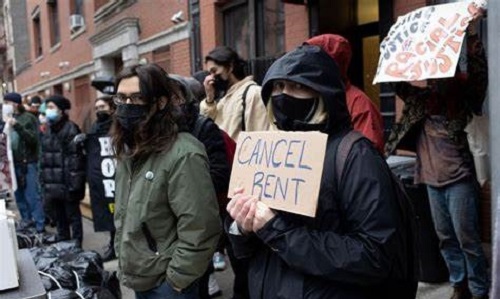
Squatting issues in the US: Unfair laws in Illinois exacerbate landlords’ woes
By Dr. Avi Verma, Publisher
Squatting, a growing concern in the United States, particularly in states governed by Democratic administrations, has reached alarming levels in Illinois, particularly in Chicago.
The state’s laws surrounding squatters’ rights have inadvertently created significant challenges for landlords, leaving them exposed to heavy financial losses and prolonged legal battles.
In New York City, several incidents have been reported where individuals have taken advantage of lenient squatting laws to occupy vacant properties illegally. Landlords in the city have struggled to remove these squatters due to the lengthy and complex eviction process, leading to frustration and financial strain.
Similarly, in Chicago, numerous cases have emerged where squatters have occupied residential properties without permission, refusing to vacate even after repeated requests from landlords. The slow and cumbersome eviction process in Illinois has allowed these squatters to remain in the properties for months on end, causing considerable financial hardship for landlords.
The eviction process in Illinois is notoriously slow, often taking seven to eight months or even longer to remove defaulting tenants from the property. This lengthy timeline provides squatters with ample opportunity to exploit the system, living rent-free while landlords bear the brunt of financial losses.
The cumbersome legal procedures and lack of swift action against squatters in Illinois exacerbate the plight of landlords, leaving them feeling helpless and frustrated by the system’s inefficiencies. Landlords are left with few options but to endure months of financial hardship and legal battles, further compounding the challenges they face in managing their properties.
The disparity between the treatment of landlords and tenants in Illinois underscores the urgent need for legislative reforms to address squatting issues and provide greater protections for property owners. While efforts to protect tenants’ rights are essential, it is imperative to enact measures that ensure landlords’ interests are also safeguarded and that the eviction process is fair, efficient, and timely.
In contrast to Illinois, Republican-led states have taken proactive steps to empower landlords and property owners with expedited eviction processes and enhanced legal protections against squatting. These states recognize the importance of balancing the rights of tenants with the legitimate concerns of landlords, ensuring swift and equitable resolution of squatting disputes.
In conclusion, the unfair laws surrounding squatters’ rights in Illinois, particularly in Chicago, perpetuate a system that disproportionately disadvantages landlords and property owners. Urgent legislative reforms are needed to streamline the eviction process, protect property rights, and mitigate the financial losses incurred by landlords due to squatting. By addressing these issues, policymakers can uphold the principles of fairness and justice in the housing sector while ensuring that landlords are not unduly burdened by the consequences of squatting.
A deep dive into New York and Chicago
In recent years, squatting incidents have surged across the United States, particularly in cities like New York and Chicago. These incidents have sparked widespread concern among landlords and property owners, highlighting the urgent need for legislative reforms to tackle the root causes of squatting and safeguard property rights.
In New York, numerous instances of squatting have been reported, where individuals exploit legal loopholes and lax enforcement to unlawfully occupy vacant properties. For example, a group of squatters in Brooklyn defiantly occupied a vacant building, resisting eviction attempts by the property owner. Similarly, in Manhattan, a family of squatters made headlines after taking over a luxury apartment for an extended period, citing their right to housing.
Meanwhile, squatting incidents have become alarmingly common in Chicago, especially in neighborhoods grappling with economic challenges and high vacancy rates. Landlords in Chicago have faced significant hurdles in evicting squatters, with the legal process often stretching over several months. In one instance, a South Side landlord struggled to remove squatters from a multi-unit property, leading to substantial financial losses and property damage.
The surge in squatting incidents can be attributed to various factors, including economic instability, housing shortages, and legal ambiguities surrounding property rights. Economic hardships and soaring housing costs have left many individuals unable to afford suitable housing, prompting them to seek alternative living arrangements, including squatting in vacant properties. Moreover, the lack of stringent laws and enforcement mechanisms against squatting has emboldened individuals to occupy properties unlawfully, exploiting the lengthy and cumbersome eviction process.
The COVID-19 pandemic has further exacerbated housing insecurity, driving some individuals to resort to squatting as a means of survival. The economic fallout from the pandemic has left many unemployed or underemployed, making it challenging to afford rent or mortgage payments. Consequently, vacant properties have become prime targets for squatting, exacerbating housing challenges and straining the resources of property owners.
In response to these challenges, policymakers must prioritize comprehensive legislative reforms to address squatting issues and strengthen property rights protections. This includes streamlining the eviction process, closing legal loopholes that enable squatters to exploit vacant properties, and providing support services for individuals facing housing insecurity. By taking proactive measures to tackle the root causes of squatting, policymakers can ensure fair treatment for both tenants and property owners, fostering a more stable and sustainable housing market.